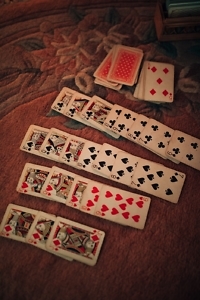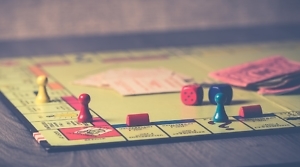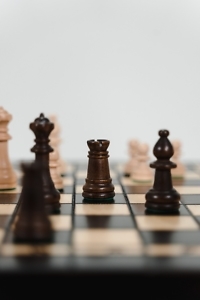The Games of Life
Fight like hell and then forgive, but don’t forget
I can hear them even now, more than a half-century later.
The yelling.

In the winter, it was indoors at a gateleg table in the dining room. In the summer, on the screened-in back porch where the night sounds of crickets, tree frogs, and racoons were overwhelmed by the outbursts, the anguished cries, the accusations. Surely their voices carried across the fields to the neighbors, though what those good people thought about the racket is lost to history.
“How dare you!”
“No!!”
“ARGHH!”
And I was caught in the middle, a young boy witness, listening, learning, feeling my way through that highly charged atmosphere. Soon enough the emotions would be mine as I entered the arena for which I was unknowingly being prepared. Until then I could only watch helplessly.
My mother and brother were playing a game.
Not just any game, although competition against any opponent over any game in my family was always intense. But double solitaire was a special case, producing a cut above the usual competitiveness, a level of emotion causing the kind of shouting that in many neighborhoods would have prompted a police response.
For the uninitiated, double solitaire is exactly what it sounds like, the staid game of cards so commonly played by the bored or the socially isolated but with two players using two decks. The result can be vicious, gladiatorial combat in which foundation cards are used by either player. An ace of hearts placed in the no-man’s-land between the ranks can just as easily help either player clear their layout, with the advantage going to the quick of eye and swift of hand. Played by two determined people, double solitaire is fast and furious, loud and boisterous, even physically dangerous. When opponents try to play onto the same foundation card at the same time, fingers are at risk.

The yelling of brother at mother and vice versa, the shrieks that would so disturb the dog and my father — “Is someone being murdered?” he would call out from deep in the house — would be replaced by laughter as the game ended, usually with vows of revenge in the next round. In that way I learned the rules and norms of competition. Fight like hell and then forgive, but don’t forget. Although most have not been as fraught as double solitaire, I have played many games against many competitors in my time. Indeed, the stages of my life have been partially defined by the games involved, whether there was yelling or not.
The earliest game I remember, played against my mother on the living room couch, was Noah’s Ark. A preschooler’s game, the goal was to pair cardboard animals and place them two-by-two into their cardboard ark. Not very competitive and governed entirely by luck, it nevertheless introduced me to the up-and-down nature of game playing. Win and loss, even that dictated by the indifferent laws of probability, is a foundational concept. Luck is always present, conspiring against the prepared mind even as it may lift the unprepared — or undeserving.
Following quickly on the blind chance of Noah’s Ark came Park and Shop, a game that added strategy and a healthy dose of mid-20th-century consumerism to the gaming environment. Players drew cards to find out what items needed to be purchased during a shopping trip, then planned a route through town to finish their errands before their opponent. A fairly simple game, it did teach me how to read a map and plan ahead. Plus, I really liked the little plastic cars and pedestrian playing pieces.
From those early learning experiences, I quickly branched out into the full range of games. Everyone in my family played something. Dad loved word games, dice games, and pool. Mom was a fierce competitor at Monopoly, rummy, and the aforementioned double solitaire, during which, in her motherly way, she would trash talk her offspring to gain psychological advantage.
My father’s father, with whom I spent much time during his years as a widower, was fond of cards despite his strict Methodist upbringing. Crazy Eights and, ironically, Oh Hell were particular favorites, and I can see him sitting at a card table in the living room, dourly studying his hand, plotting his next bid.
Mom’s father was a champion cribbage player, though of my immediate family only my brother ever learned to play that complex game. With Grandma it was Chinese checkers, set up on the big table in the basement of their little house in town.

My siblings, older than I, helped guide me through the preschool and early games of luck, then became real competitors when we could all play word games — my sister’s favorites — and games of skill. My brother introduced me to war games and I became an aficionado of those military board games, the modern equivalents of chess. I played them against high school and college friends, and although I had trouble with Greek or Roman simulations I could, on the hypothetical battlefields of Europe, regularly command either NATO or Warsaw Pact armor to victory.
As a rural family, our contests were not limited to cards and boards. Our yard was witness to badminton, croquet, football, baseball, even contests with the long-ago-banned lawn darts. Neighbors visited for some of the games, including ice hockey when winter froze the pond. With college came golf and an odd blip in the family games tradition. Although both Dad and his father had played the links, they had given it up by the time I started working on my backswing. I never played golf — other than the miniature kind — with a family member.
Thus it went, through the seasons of my life, a different set of games at each stage. But always the competition, always that famous thrill of victory and agony of defeat. And always, because it was demanded of me from a young age, good sportsmanship. Graciousness was required in victory or defeat.
When I met the woman I would marry, she fit right into this tradition. Her first Christmas gift to me was a set of darts, the favored game of my grad school days. Our children followed our lead, becoming avid competitors, working their way up from Candyland to Bananagrams and chess, among many others. We watched them through the ups and downs of winning and losing, always wanting to come back for more, whether to savor the win or soothe the loss with another contest.
Now the mature years have set in and the opportunities available for games have diminished. The kids are off pursuing their own lives, my siblings are many hours away, and our parents are long gone. But the contests have not disappeared. Whether a quiet game of backgammon with my wife or a rousing session of Trivial Pursuit with the neighbors on a Thanksgiving night, the competition lives on. The shouts may not be as loud as they were on that long-ago porch, but the challenge is still there, still demanding all-out effort and the offered word of congratulation regardless of the outcome.
They were not the playing fields of Eton, but the games of my life trained me, made me what I am, taught me to weather the storms and come back to try again, to treat people with fairness in love or war. Those games won me my life.

Copyright © 2021 by Chris Scott. All rights reserved. A Michigan native, Chris Scott is an unrepentant Yankee who arrived in Nashville more than 30 years ago and has gradually adapted to Southern ways. He is a geologist by profession and a historian by avocation.

